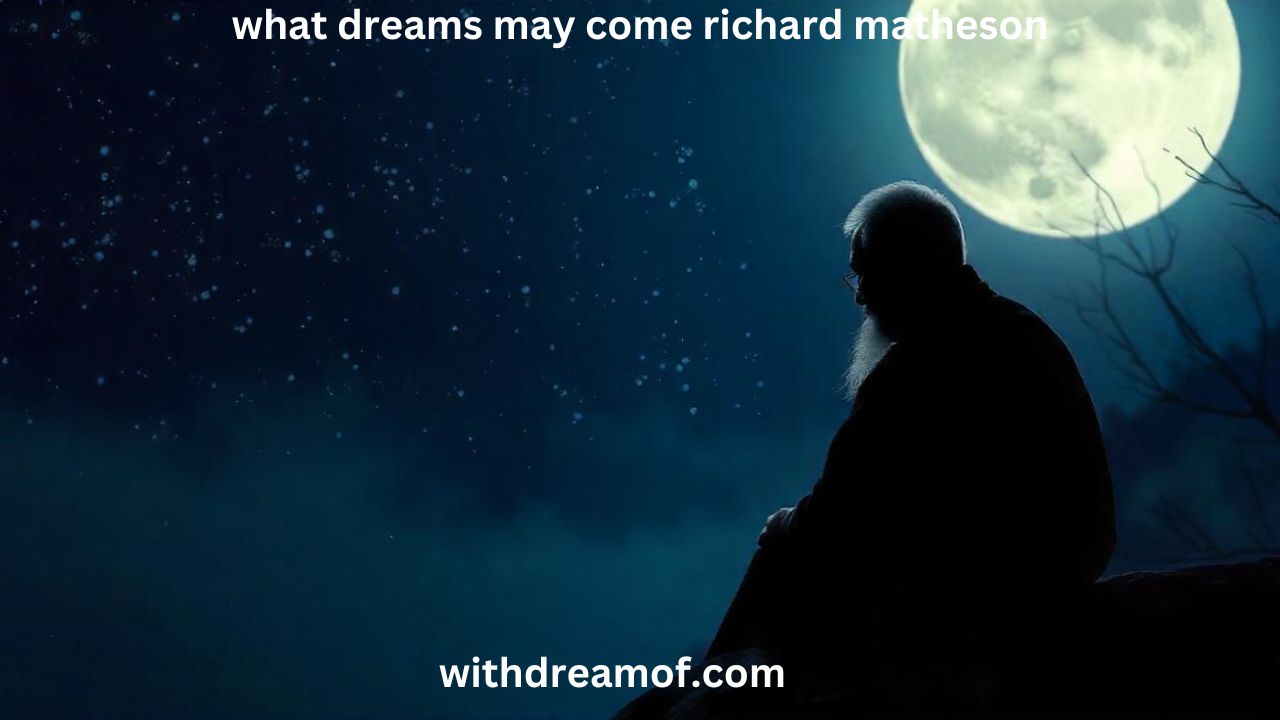Richard Matheson, a master of speculative fiction, crafted a timeless piece with his 1978 novel, What Dreams May Come. The story delves deeply into themes like the afterlife, love, and redemption. Its philosophical undertones make it much more than just a work of fiction. This book leaves readers pondering life’s purpose, death, and what might come afterward. Let’s take an immersive journey through the intricate world Matheson created.
The Inspiration Behind What Dreams May Come
Matheson’s fascination with metaphysical concepts inspired What Dreams May Come. Influenced by spiritual literature and philosophical texts, he sought to explore what happens after death. Matheson did extensive research on the afterlife, drawing from spiritualist theories and accounts of near-death experiences. This foundation gave his novel a unique blend of imaginative fiction and spiritual exploration, making it both thought-provoking and emotionally resonant.
Plot Overview: Chris Nielsen’s Journey Beyond Death
The novel begins with Chris Nielsen, a successful screenwriter, who tragically dies in a car accident. This untimely event catapults him into an ethereal world where he learns to navigate the afterlife. However, Chris finds it difficult to let go of his beloved wife, Ann. Even after death, his deep connection with her persists. Despite being in a realm filled with boundless beauty and tranquility, Chris cannot rest. When Ann, overwhelmed by grief, takes her own life, she ends up in a much darker place. Chris makes the bold decision to embark on a perilous journey to save her soul.
Exploring the Afterlife in What Dreams May Come
Matheson’s depiction of the afterlife differs from traditional religious beliefs. In this world, thoughts shape reality. Heaven reflects one’s desires, while hell is a manifestation of one’s inner torment. The novel suggests that people have the power to mold their surroundings even after death. This concept introduces a fascinating layer to the story, challenging readers to rethink preconceived notions of heaven and hell.
Matheson avoids relying solely on religious doctrine. Instead, he focuses on the power of human thought, love, and forgiveness. This approach gives the afterlife a more universal appeal. It invites readers from various spiritual backgrounds to consider the possibilities beyond this life.
Themes of Eternal Love and Redemption
One of the novel’s central themes revolves around the transformative power of love. Chris and Ann’s bond transcends death, showcasing the idea that love can conquer even the darkest realms. Matheson masterfully weaves their story to highlight the lengths one can go for a loved one. Chris’s journey into hell to retrieve Ann parallels the myth of Orpheus and Eurydice, where love pushes a soul to brave the underworld.
Matheson also explores redemption. Ann’s despair leads her to a self-inflicted purgatory, but Chris’s unwavering love offers her a path to salvation. Their story suggests that souls have the potential to heal and change, no matter how lost they may seem. This theme resonates strongly, urging readers to believe in the possibility of redemption even in the darkest moments.
Character Analysis: Chris and Ann Nielsen
Chris Nielsen embodies the essence of selfless love. He sacrifices eternal peace to save Ann from damnation. His character showcases immense resilience and loyalty. Further, Chris’s journey becomes a testament to the strength of the human spirit, even beyond death.
Ann, on the other hand, struggles with despair and guilt. Matheson paints her as a deeply complex character who battles inner demons. Her story highlights the devastating effects of grief and how it can cloud judgment. Further, Ann’s transformation from despair to hope provides a powerful arc that underscores the novel’s message of redemption.
The Role of Free Will in the Afterlife
Matheson emphasizes the concept of free will throughout the narrative. In What Dreams May Come, souls create their own realities based on their beliefs and emotions. Chris’s experience in heaven reflects his optimistic outlook on life, while Ann’s descent into darkness mirrors her inner turmoil. This concept serves as a powerful metaphor for the choices people make during their lives and the consequences that follow.
The idea that individuals can change their circumstances, even in the afterlife, empowers readers. It suggests that while one’s past actions shape their reality, they always have the power to change their future through conscious effort. This theme speaks to the heart of personal growth and transformation.
A Unique Take on Heaven and Hell
Matheson’s vision of the afterlife strays from traditional religious interpretations. Heaven in this novel doesn’t consist of golden gates or angelic choirs. Instead, it becomes a reflection of one’s happiest memories and deepest desires. Hell, conversely, isn’t a place of eternal fire but a realm filled with the anguish of one’s mind. Matheson’s portrayal emphasizes that heaven and hell are states of mind rather than physical places.
This refreshing take challenges readers to rethink their own beliefs about the afterlife. The novel suggests that inner peace or turmoil can follow individuals even beyond death. Matheson cleverly uses this concept to explore human nature and the power of self-reflection.
The Influence of Spiritualism on the Novel
Matheson’s background research on spiritualism greatly influenced What Dreams May Come. He drew inspiration from works like A Wanderer in the Spirit Lands by Franchezzo and Life in the World Unseen by Anthony Borgia. These texts offered him insights into the metaphysical world, which he incorporated into his narrative. Matheson’s afterlife reflects spiritualist ideas, such as the belief in soul progression and the ability to communicate with the living.
By blending fiction with spiritualist philosophies, Matheson creates a story that feels both imaginative and grounded. This approach allows the novel to resonate with readers who seek answers about what lies beyond death.
The Adaptation of What Dreams May Come into a Film
In 1998, What Dreams May Come received a film adaptation directed by Vincent Ward and starring Robin Williams. While the movie retained the core elements of the novel, it took creative liberties with the plot. The visual representation of the afterlife captured the book’s vivid descriptions but added a more dramatic flair. The film’s artistic interpretation received praise for its stunning visuals but also drew criticism for straying from Matheson’s original vision.
Despite these differences, the movie helped introduce Matheson’s story to a broader audience. For those intrigued by the concept of life after death, both the book and the film offer unique perspectives that complement each other.
The Enduring Legacy of Richard Matheson
Richard Matheson’s impact on speculative fiction extends far beyond What Dreams May Come. His work inspired countless writers and filmmakers, including Stephen King and George A. Romero. Furthermore, Matheson’s ability to explore deep philosophical questions through engaging narratives set him apart as one of the genre’s greats. What Dreams May Come remains a testament to his talent for blending the supernatural with human emotion.
Further, The novel’s exploration of love, loss, and the afterlife continues to captivate readers even decades after its publication. Matheson’s work encourages us to consider our own beliefs about life, death, and what may come afterward.
FAQs
what inspired richard matheson to write what dreams may come?
Matheson drew inspiration from spiritualist literature and philosophical texts, aiming to explore the afterlife in a unique way.
how does what dreams may come explore the theme of redemption?
The novel emphasizes that love and selflessness can lead to salvation, even in the darkest realms.
what is the significance of free will in what dreams may come?
The novel portrays the afterlife as a reflection of one’s inner thoughts, emphasizing the power of free will.
is the film adaptation of what dreams may come faithful to the book?
While the film captures the book’s essence, it deviates in plot details and takes creative liberties for visual impact.
how does matheson’s depiction of heaven differ from traditional beliefs?
Matheson portrays heaven as a state of mind shaped by personal desires, moving away from religious conventions.
what makes what dreams may come a timeless novel?
Its exploration of universal themes like love, redemption, and the afterlife makes it a thought-provoking read for all generations.
Conclusion
Richard Matheson’s What Dreams May Come stands as a profound exploration of the afterlife, love, and the resilience of the human spirit. By blending speculative fiction with spiritual philosophies, Matheson challenges readers to consider the possibilities that lie beyond our earthly existence. Whether you approach it as a work of fiction or a philosophical treatise, this novel leaves an indelible mark, urging you to ponder life’s deeper questions long after the final page.











